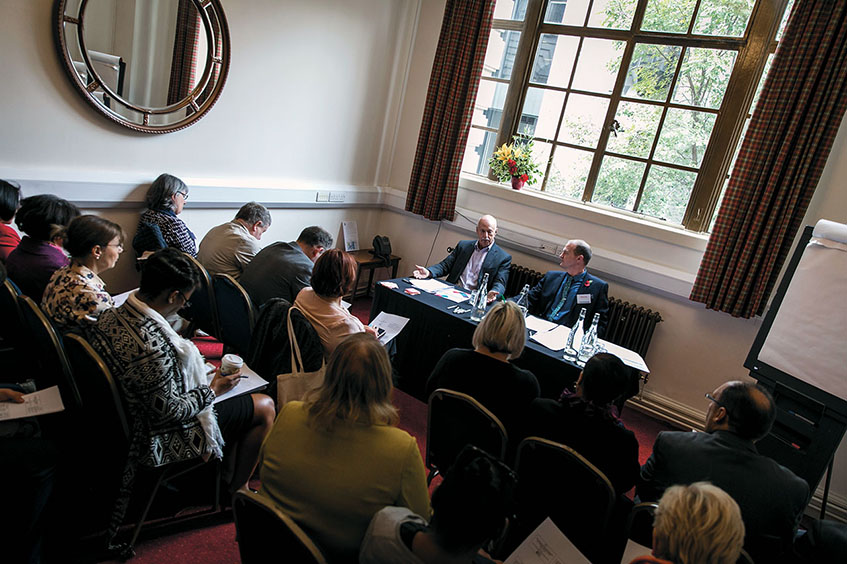Escaping the blame culture in the NHS
Research shows the blame culture in the NHS is costly to both patients and staff. At an MiP Summit workshop, NHS managers and workforce expert Roger Kline discussed new approaches to line management which focus on learning and improvement.

Health professionals know that prevention is better than cure; by improving public health, we hope to reduce the load on NHS services. But as Roger Kline told a workshop at the 2017 MiP Members’ Summit, the NHS often takes a purely reactive approach to disciplining its own staff.
The typical NHS approach to HR is “to wait until something goes wrong or somebody raises concerns and then respond to it, rather than taking something like a public health approach to these things: being proactive and preventing it,” said Kline, who has been both a workforce adviser to NHS England and a senior trade union official, and is currently a research fellow at Middlesex University Business School.
Rather than seeing complaints and service failures as a cue to improve systems and processes, he argued, NHS organisations focus on acting against the alleged culprit. This pushes employees straight into punitive disciplinary procedures that damage their careers, suck up resources and weaken NHS service delivery. Meanwhile, underlying and systemic problems are left to fester, perpetuating the risks for both patients and staff.
Kline’s perspective clearly chimed with the experience of the audience of MiP members attending the workshop. Members agreed that senior managers and regulators frequently react to suspected malpractice by pushing for immediate suspensions. Often, said one HR manager, the staff handling a disciplinary case “are getting pressure from above saying: ‘I want them out, I want them suspended, and you have to do whatever it takes to make that happen’”. In some cases, an MiP national officer added, senior leaders suspend people without any evidence of gross misconduct simply to strengthen their case in any future employment tribunal case.
This is a tragedy for those subsequently found innocent of any malpractice, as suspensions wreck people’s careers, Kline replied: “The number of people who are suspended and then come back to work is very, very small indeed – they tend to move on”. So the NHS organisation loses an experienced manager, while saddling itself with recruitment costs and productivity losses estimated by Oxford Economics to average £35,000.
What’s more, Kline argued, a knee-jerk recourse to formal disciplinary procedures often leads to discrimination against BME staff. Managers are less likely to hold informal discussions with BME staff than with white workers, he said, so a higher proportion of BME staff are pushed into an HR process – “and once you go down a formal path, you’ll always find things that people shouldn’t have done or could’ve done better.”
BME and white nursing staff, he noted, have about the same chance of being referred to the Nursing and Midwifery Council (NMC) by members of the public – but BME workers are far more likely than their white colleagues to be referred to the NMC by their employers. “You can draw your own conclusions as to why that might be,” he added.
It doesn’t have to be like this, Kline argued. By adopting “an approach focused on what to learn, not who to blame”, employers can both avoid mission creep in the application of formal disciplinary procedures, and address the organisational or process weaknesses that led to the failure in the first place.
When considering disciplinary procedures, he explained, managers should ask themselves four questions. Did the worker intend to cause harm? Were they drunk or otherwise impaired? Did they knowingly and unreasonably increase risk by violating safe operating procedures? And would another similar employee have acted in the same manner? “If the answer to those questions is no, no, no and yes, it’s very likely that we’re looking at a system problem rather than an individual problem,” he said.
Trusts piloting this “disciplinary triage” approach have had remarkable results, Kline explained. One big London hospital halved the number of disciplinary cases in seven months; another trust’s mental health services have seen an even bigger fall. And following reforms, staff are more likely to alert managers when something has gone wrong, so system weaknesses are more easily identified. “The evidence is that their outcomes for patients are significantly better,” Kline said.
Asked whether NHS organisations have “gone backwards” on these issues since 2000, Kline suggested many are distracted by funding problems: “As long as the pressure on resources is there, this is a bit of an uphill struggle – but that doesn’t make it any less important.” And strong leadership is more important than cash to successfully delivering reforms. “The fish rots from the head,” he said, “and if you can’t get leaders to take this on board, it’s a very brave manager who does so. What happens at the top is crucial: the leadership has to buy into this, and model the behaviours extensively”.
Even with buy-in from the board, Kline acknowledged, enacting these reforms isn’t always easy. As an audience member pointed out, professional bodies often run their own investigations into alleged malpractice – so even if an employer stops short of formal disciplinary action, professional bodies can “jump the gun, triggering a series of events regardless of what’s going on in the employer”.
Kline was optimistic that professional bodies are starting to shift their position. “Having spent five years arguing with the NMC about this, I’m now persuaded that they’re serious about adopting a similar approach,” he said, adding that the General Medical Council “in different ways, is trying to move in a similar direction”.
Meanwhile, Kline noted that senior managers are increasingly protecting themselves from disciplinary action – for example, by closing services when shortages of staff or resources create the potential for mistakes. “The chief executive at Portsmouth has said that they’re going to take a financial hit rather than run the risk of running unsafe services,” he said. “The nursing director at Hull and East Yorkshire last week closed an orthopaedic ward, and said: ‘I’m not prepared to run any ward with less than two registered nurses on it’.”
That decision is “absolutely right”, Kline said, “because case law on duty of care makes clear that whatever you do, you must be able to do it safely. Better to do what you can safely, than to try to do everything and have something go wrong – because it’s the manager who gets the blame.”
Against this dark background, Kline insists he is “a bit optimistic, because nowadays there are more people at senior level that understand some of this. And there are a number of trusts – if not many and not enough – who understand it”. Along with NHS Resolution and the NHS Litigation Authority, Kline explained, he’s gathering evidence to support more widespread change. Early next year, he intends to publish a paper on the experience of trusts who’ve adopted a disciplinary triage approach. “I think that will make it much easier for people like yourselves to say: ‘If they can do it, why can’t we?’”
The current approach may provide short-term protection for trusts by loading the blame for errors onto individuals. But in the long term, the costs are shared between innocent staff whose careers are ruined, NHS bodies which lose experienced managers and damaged staff engagement, and the patients put at risk by continued systemic weaknesses. “It really is time that the NHS looked at the literature and learned that we need accountability, but without blame,” concluded Kline. “We need interventions that work, rather than simply ticking a box.”
Matt Ross is a journalist, change manager and adviser to MiP.
Related News
-

NHS job cuts: you’ll never walk alone
As the NHS redundancies in England loom, Rhys McKenzie explains how MiP will back you, and how members supporting each other and acting collectively is the best way to navigate this difficult process.
-

What now? Seven expert takes on the Ten-Year Plan
The government’s Ten-Year Plan for the NHS in England has met with enthusiasm and exasperation in equal measure. We asked seven healthcare experts to give us their considered view on one aspect that interests, excites or annoys them.
-

NHS job cuts: what are your options?
When politicians start reforming the NHS, there is only one certainty: some people will lose their jobs. But what options might be on the table and how does redundancy work? Corrado Valle explains.